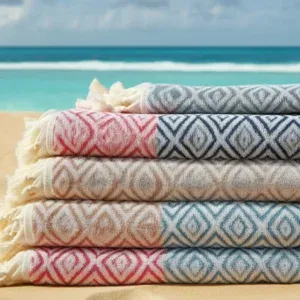Everything You Need to Know About Beach Towels
Beach towels aren’t something you might say an essential item but undoubtedly the greatest accessory anyone might wish for going by the swimming pool or beach.
Given the varieties of vibrant colors and designs made from quick-drying material, beach towels are fashioned for activities regarding water-related activities. Read through every angle in our discussion: what are these used for, which type, the difference, and similarities between it and the use of some other types.
What is a Beach Towel Used For?
Beach towels are multifunctional, with primary uses that include:
- Drying Off: After swimming in the ocean or a pool, beach towels provide an effective way to dry off due to their high absorbency.
- Laying Out: Beach towels are larger than standard bath towels, making them ideal for laying out on the sand or a pool chair.
- Protection from Sand and Heat: Acting as a barrier between you and the sand, a beach towel provides a comfortable surface and protects your skin from the hot sand or concrete around pools.
- Versatile Utility: Beach towels can also be used as makeshift blankets at picnics, outdoor concerts, and even as wraps or cover-ups at the beach.

What Type of Beach Towel is Best?
The best beach towel depends on your specific needs, but some key factors to consider are material, size, absorbency, and durability. Here are some popular types:
- Cotton Beach Towels: Known for their softness and absorbency, cotton beach towels are popular among those who value comfort. They are generally larger and thicker, providing a luxurious feel, but they may take longer to dry than microfiber options.
- Microfiber Beach Towels: Lightweight and compact, microfiber towels dry quickly and repel sand. They’re ideal for travelers who need a towel that’s easy to pack and maintain.
- Turkish and Egyptian Cotton Beach Towels: These premium cotton options offer superior softness and absorbency. Turkish towels, in particular, are thinner than traditional cotton towels but still very absorbent, making them highly versatile.
- Eco-Friendly Options: Towels made from recycled materials or organic cotton are environmentally friendly, often without compromising on quality.
Each type of towel has its strengths, but microfiber and Turkish cotton are the top choices for anyone who values quick-drying, lightweight options.
How Do You Describe a Beach Towel?
A beach towel is usually large and rectangular in shape, measuring about 30 x 60 inches or more. Beach towels are made of absorbent material like cotton or microfiber. Most beach towels are also colorful with summery designs. A beach towel has two sides: one side dries you off, and the other side is comfortable when you lie on the sand or by the pool.
They are really very light in weight, so vibrant, and stand out as something that isn’t a normal bath towel; beach towels are synonymous with images of sun, sea, and sand; it is really all about the experience and the fun.
What is the Difference Between a Beach Towel and a Swimming Towel?
While beach towels and swimming towels may seem interchangeable, they have notable differences:
- Size: Beach towels are usually larger to provide space to lie down or wrap around you fully. Swimming towels, typically used in gyms or pools, are often smaller and easier to handle.
- Thickness: Swimming towels are designed to dry the body quickly and are therefore thicker. Beach towels, in contrast, are thinner, which makes them easier to shake off sand and hang to dry quickly.
- Design: Beach towels are often colorful and patterned, while swimming towels are generally plain or have minimal designs for practical use.
Beach towels are generally more versatile and suitable for outdoor use, while swimming towels are ideal for indoor use around pools.
What is the Difference Between a Beach Towel and a Blanket?
While both can serve similar functions outdoors, here’s how they differ:
- Purpose: A beach towel is designed for drying off after water activities, whereas a beach blanket is typically used for sitting on or as a picnic surface.
- Material: Beach blankets are often made from thicker materials, like fleece or nylon, which aren’t ideal for drying. Beach towels are made from absorbent materials like cotton or microfiber.
- Sand Resistance: Beach towels are crafted to repel sand, while blankets are not as effective in this aspect.
In summary, a beach towel is multifunctional for drying and sitting, while a blanket is more suited for lounging in a group.

Can I Use a Normal Towel as a Beach Towel?
Yes, you can use a standard towel at the beach, but they will not work as well as beach towels. Regular towels are often smaller and thicker, holding more sand and moisture. Moreover, they are not built to dry quickly, so repeated use during the day at the beach is a problem. The larger size, fast-drying material, and lightweight construction of a beach towel make it a better choice for outdoor use.
Do Beach Towels Dry Faster?
Beach towels are usually made of materials that dry quickly, such as microfiber or lightweight cotton blends. Microfiber towels dry faster than cotton towels and are perfect for people who have to pack up and move a lot. Fast-drying beach towels are also less likely to smell bad because they prevent the buildup of moisture for long periods.
Can You Use a Beach Towel for Shower?
You can use a beach towel after you shower, although it might not be as soft or absorbent as a bath towel. Beach towels are thinner and, though they get the job done, do not offer the same plush comfort. If you’re traveling or just have a beach towel available, however, it’ll be fine for drying off. Many like the fact that beach towels are able to be multi-threaded, so they can use them for traveling purposes as well as drying after a shower.
How to Choose the Best Beach Towel for Your Needs
When selecting a beach towel, consider the following tips:
- Material: Choose microfiber for quick drying and easy maintenance, or cotton for softness and comfort.
- Size: Go for a larger towel if you prefer extra space to lie down or wrap up.
- Design: Pick a towel with vibrant colors or patterns that match your personal style.
- Thickness: Thicker towels are more comfortable but may take longer to dry, while thinner ones are lightweight and quick to dry.
- Durability: Ensure the towel is made from quality materials that will withstand sun exposure, sand, and repeated washing.

Cotton Oversized Beach Towel – Large 70 x 35 Inch Pool Towel, Rose Red Striped Quick Dry Swimming Cabana Towel

Utopia Towels [4 Pack Cabana Stripe Beach Towel, (30×60 Inches) Oversized 100% Ringspun Cotton Pool Towels,
Conclusion
A beach towel is quite an indispensable thing when it comes to relaxing outside and then drying up by the water. With colorful designs or versatility, they offer that unique combination of functionality with style. You may choose a cotton towel for comfort, or microfiber for convenience, but a good towel always enhances your beach experience or any experience you have next to a pool. With so many options available, choosing the perfect beach towel can really be fun and practical to ensure the best accessory for any beach adventure.
FAQs
Rinse it thoroughly after use, wash gently, and hang it to dry out of direct sunlight when possible.
How often should I wash my beach towel?
Ideally, after each use to prevent buildup of sand, salt, or chlorine.
Are beach towels machine-washable?
Yes, most beach towels are machine-washable; follow care instructions for best results.
Can I use fabric softener on my beach towel?
It’s generally best to avoid fabric softeners, as they can reduce absorbency over time.
What’s the average lifespan of a beach towel?
With proper care, a beach towel can last for several years.
How can I make my beach towel last longer?

